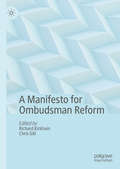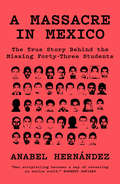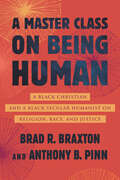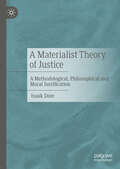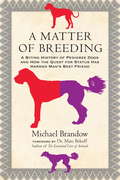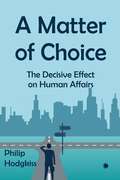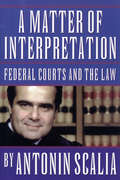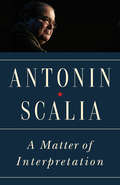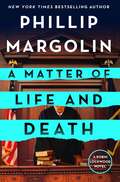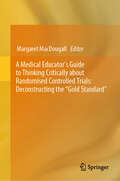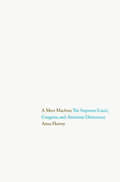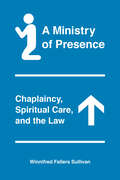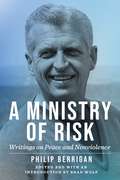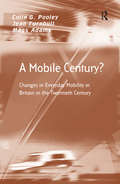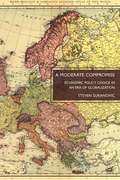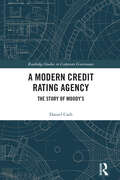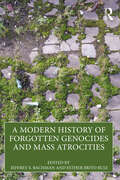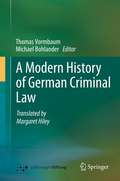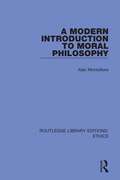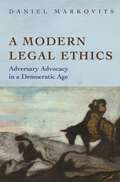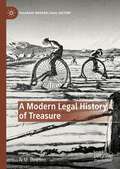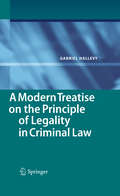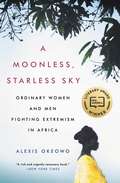- Table View
- List View
A Manifesto for Ombudsman Reform
by Richard Kirkham Chris GillThis book seeks to persuade policy-makers and legislators of the need for legislative reform of the ombudsman sector, and to evidence the ways in which such reformative legislation can be designed. In pursuing this goal, this edited collection represents an academic response to a challenge laid down by the current Parliamentary Ombudsman in February 2018, at a JUSTICE event. It draws on the original research of the authors and bases its proposals for reform on a fundamental re-assessment of the focus and purpose of ombudsman systems. A Manifesto for Ombudsman Reform deals with key, recurring controversies in ombudsman scholarship, including the role that the ombudsman should be fulfilling, the procedures it should employ, the powers that are necessary for effectiveness, and the means of ensuring both freedom of operation and accountability. It will inform academic and policy debates about the future of the ombudsman institution in the UK and its analysis should be of interest to academics and policy-makers in other jurisdictions.
A Massacre in Mexico: The True Story Behind the Missing Forty-Three Students
by John Washington Anabel HernandezThe definitive account of the disappearance of forty-three Mexican studentsOn September 26, 2014, a party of students from the Ayotzinapa Rural Teachers’ College were en route to a protest when intercepted by local police. A confrontation ensued. Come the morning, the students were nowhere to be found. The crime that had transpired and the resultant cover-up brought the profound depths of corruption in the Mexican government and police force—as well as the vulnerability of ordinary Mexicans—into stark relief.Investigative reporter Anabel Hernández reconstructs the terrible events of that night and its aftermath, giving us the most complete picture available. Her sources are unparalleled. In researching this book, she secured access to internal government documents that have not been made public and to surveillance footage the government has tried to hide and destroy. Hernández demolishes the Mexican state’s official version of events, which the Peña Nieto government cynically dubbed the “historic truth.” As her research shows, state officials at all levels, from police and prosecutors to the upper echelons of government, conspired to put together a fake case, concealing and manipulating evidence, and arresting and torturing dozens of “suspects,” procuring forced confessions to back up the official lie. By following the role of the various Mexican state agencies through the events in such remarkable detail, A Massacre in Mexico shows with exacting precision precisely who is responsible for this monumental crime and who needs to be held accountable.
A Master Class on Being Human: A Black Christian and a Black Secular Humanist on Religion, Race, and Justice
by Brad Braxton Anthony PinnA conversation between 2 eminent Black thinkers on how to work together to make the world a better place despite deep religious differencesBrad Braxton and Anthony Pinn represent two traditions—Christianity and Secular Humanism respectively—that have for centuries existed in bitter opposition. For too long, people with different worldviews have disparaged and harmed one another. Instead of fighting each other, Braxton and Pinn talk with, listen to, and learn from one another. Their wide-ranging conversation demonstrates the possibility of fruitful exchange that accounts for—rather than masks—their differences.Written amid the Covid-19 pandemic, threats to our democracy, and national protests for racial justice, A Master Class on Being Human shows us that constructive dialogue can help us pursue the common good without sacrificing our distinctive identities. In conversations that are frank, personal, and deeply informed by scholarship, Braxton and Pinn discuss topics that are urgent and immediate, such as the ongoing violence against Black communities, the rise of religiously unaffiliated communities, the Black Lives Matter movement. They also ponder those broader philosophical and theological questions that inform our politics and sense of what it means to be human: the meaning of religion, the stubborn dilemma of moral evil, the power and problems of hope.Braxton and Pinn invite us to join them in a master class as they strive to create a world where differences are not tolerated but instead celebrated. In that kind of courageous classroom, all can learn how to be better people who in turn transform the world into a better place.
A Materialist Theory of Justice: A Methodological, Philosophical and Moral Justification
by Isaak DoreThis book presents a comprehensive theory of justice that has a threefold justification. For the first justification, the book presents a rigorously empirical methodology based on the stark realities of the human condition. It has a strong anthropological grounding in that it is adapted from the methodology of cultural materialism which, in turn, is founded on the materialist epistemology of Karl Marx. The second justification is philosophical. The theory of justice derived from the above methodology is further buttressed by and/or tested against the major trends of Western philosophy as represented by the thought of Aristotle, Thomas Hobbes, Thomas Aquinas, Immanuel Kant, Georg W. F. Hegel, John Finnis, John Dewey, George Mead, Jürgen Habermas, Michel Foucault, Jean-François Lyotard, Axel Honneth, Michael Sandel, Michael Walzer, Martha Nussbaum, John Maynard Keynes, Amartya Sen and Karl Marx. The third justification is moral. The promotion of human flourishing on the basis of fairness and equality are the minimum goals to be achieved; after which a more ambitious and comprehensive theory of overall goodness —based on individual and governmental action —can be implemented.
A Matter of Breeding
by Michael BrandowA provocative look at the "cult of pedigree" and an entertaining social history of purebred dogs In this illuminating and entertaining social history, social critic Michael Brandow probes the "cult of pedigree" and traces the commercial rise of the purebred dog. Combining consumer studies with sharp commentary, A Matter of Breeding reveals the sordid history of the dog industry and shows how our brand-name pets--from Labs to French bulldogs and everything in between--pay the price with devastatingly poor health.From the Trade Paperback edition.
A Matter of Choice: The Decisive Effect on Human Affairs
by Philip HodgkissA Matter of Choice represents a substantive discussion of the concept of choice in human affairs, taken against the backdrop of ethics and religion. Drawing on a range of contributions, Hodgkiss demonstrates in this study that, though often not the primary issue under consideration, a concern with choice has featured continually in human thought from the Hellenistic world of the Stoics to the post-Kantian environment of modern philosophy. Moreover, he argues that the social and historical dimension of choice has been consistently underplayed, and that the role of choice in modern economic and political developments is underestimated at our peril. Through a critical account of the literature, Hodgkiss adeptly diagnoses the insufficiency of the current conception of the choice-making sovereign individual in the contemporary liberal-democratic capitalist context and outlines the implications of this philosophy for the choice-maker.
A Matter of Interpretation: Federal Courts and The Law
by Antonin ScaliaWe are all familiar with the image of the immensely clever judge who discerns the best rule of common law for the case at hand. According to U. S. Supreme Court Justice Antonin Scalia, a judge like this can maneuver through earlier cases to achieve the desired aim--"distinguishing one prior case on his left, straight-arming another one on his right, high-stepping away from another precedent about to tackle him from the rear, until (bravo!) he reaches the goal--good law. " But is this common-law mindset, which is appropriate in its place, suitable also in statutory and constitutional interpretation? In a witty and trenchant essay, Justice Scalia answers this question with a resounding negative. In exploring the neglected art of statutory interpretation, Scalia urges that judges resist the temptation to use legislative intention and legislative history. In his view, it is incompatible with democratic government to allow the meaning of a statute to be determined by what the judges think the lawgivers meant rather than by what the legislature actually promulgated. Eschewing the judicial lawmaking that is the essence of common law, judges should interpret statutes and regulations by focusing on the text itself. Scalia then extends this principle to constitutional law. He proposes that we abandon the notion of an everchanging Constitution and pay attention to the Constitution's original meaning. Although not subscribing to the "strict constructionism" that would prevent applying the Constitution to modern circumstances, Scalia emphatically rejects the idea that judges can properly "smuggle" in new rights or deny old rights by using the Due Process Clause, for instance. In fact, such judicial discretion might lead to the destruction of the Bill of Rights if a majority of the judges ever wished to reach that most undesirable of goals. This essay is followed by four commentaries by Professors Gordon Wood, Laurence Tribe, Mary Ann Glendon, and Ronald Dworkin, who engage Justice Scalia's ideas about judicial interpretation from varying standpoints.
A Matter of Interpretation: Federal Courts and the Law
by Antonin Scalia Amy GutmannWe are all familiar with the image of the immensely clever judge who discerns the best rule of common law for the case at hand. According to U.S. Supreme Court Justice Antonin Scalia, a judge like this can maneuver through earlier cases to achieve the desired aim—"distinguishing one prior case on his left, straight-arming another one on his right, high-stepping away from another precedent about to tackle him from the rear, until (bravo!) he reaches the goal—good law." But is this common-law mindset, which is appropriate in its place, suitable also in statutory and constitutional interpretation? In a witty and trenchant essay, Justice Scalia answers this question with a resounding negative.In exploring the neglected art of statutory interpretation, Scalia urges that judges resist the temptation to use legislative intention and legislative history. In his view, it is incompatible with democratic government to allow the meaning of a statute to be determined by what the judges think the lawgivers meant rather than by what the legislature actually promulgated. Eschewing the judicial lawmaking that is the essence of common law, judges should interpret statutes and regulations by focusing on the text itself. Scalia then extends this principle to constitutional law. He proposes that we abandon the notion of an everchanging Constitution and pay attention to the Constitution's original meaning. Although not subscribing to the “strict constructionism” that would prevent applying the Constitution to modern circumstances, Scalia emphatically rejects the idea that judges can properly “smuggle” in new rights or deny old rights by using the Due Process Clause, for instance. In fact, such judicial discretion might lead to the destruction of the Bill of Rights if a majority of the judges ever wished to reach that most undesirable of goals.This essay is followed by four commentaries by Professors Gordon Wood, Laurence Tribe, Mary Ann Glendon, and Ronald Dworkin, who engage Justice Scalia’s ideas about judicial interpretation from varying standpoints. In the spirit of debate, Justice Scalia responds to these critics.Featuring a new foreword that discusses Scalia’s impact, jurisprudence, and legacy, this witty and trenchant exchange illuminates the brilliance of one of the most influential legal minds of our time.
A Matter of Life and Death: A Robin Lockwood Novel (Robin Lockwood #4)
by Phillip Margolin"A genuine whodunnit" (Kirkus Reviews)--Phillip Margolin, the master of the courtroom thriller, returns with A Matter of Life and Death, a classic mind-bending puzzle, as Attorney Robin Lockwood must face her most challenging case yet, with everything stacked against her client and death on the line. Joe Lattimore, homeless and trying desperately to provide for his young family, agrees to fight in a no-holds-barred illegal bout, only to have his opponent die. Lattimore now finds himself at the mercy of the fight's organizers who blackmail him into burglarizing a house. However, when he breaks in, he finds a murdered woman on the floor and the police have received an anonymous tip naming him the murderer.Robin Lockwood, an increasingly prominent young attorney and former MMA fighter, agrees to take on his defense. But the case is seemingly airtight—the murdered woman's husband, Judge Anthony Carasco, has an alibi and Lattimore's fingerprints are discovered at the scene. But everything about the case is too easy, too pat, and Lockwood is convinced that her client has been framed. The only problem is that she has no way of proving it and since this is a death case, if she fails then another innocent will die.
A Matter of Obscenity: The Politics of Censorship in Modern England
by Christopher HilliardA comprehensive history of censorship in modern BritainFor Victorian lawmakers and judges, the question of whether a book should be allowed to circulate freely depended on whether it was sold to readers whose mental and moral capacities were in doubt, by which they meant the increasingly literate and enfranchised working classes. The law stayed this way even as society evolved. In 1960, in the obscenity trial over D. H. Lawrence's Lady Chatterley's Lover, the prosecutor asked the jury, "Is it a book that you would even wish your wife or your servants to read?" Christopher Hilliard traces the history of British censorship from the Victorians to Margaret Thatcher, exposing the tensions between obscenity law and a changing British society.Hilliard goes behind the scenes of major obscenity trials and uncovers the routines of everyday censorship, shedding new light on the British reception of literary modernism and popular entertainments such as the cinema and American-style pulp fiction and comic books. He reveals the thinking of lawyers and the police, authors and publishers, and politicians and ordinary citizens as they wrestled with questions of freedom and morality. He describes how supporters and opponents of censorship alike tried to remake the law as they reckoned with changes in sexuality and culture that began in the 1960s.Based on extensive archival research, this incisive and multifaceted book reveals how the issue of censorship challenged British society to confront issues ranging from mass literacy and democratization to feminism, gay rights, and multiculturalism.
A Medical Educator's Guide to Thinking Critically about Randomised Controlled Trials: Deconstructing the "Gold Standard"
by Margaret MacDougallDrawing on the statistical and philosophical expertise of its authors, this book is designed to improve understanding and use of randomised controlled trials (RCTs) among health professionals. It is intended for use primarily by medical educators involved in teaching statistics and evidence-based medicine (EBM) to medical students, junior doctors and other health professionals. However, each of the chapters serves a wider range of interests, including the practical needs of physicians in interpreting research evidence to support clinical decision making and the teaching needs of philosophers of medicine who want to more fully appreciate how RCTs work in practice and provide engaging examples for their students. Rather than compete with the proliferating methodological literature on RCT designs, this book focuses on cultivating a healthy skepticism among developing health professionals to support critical appraisal of their own and published work on RCTs at a fundamental level, including through a more informed understanding of the place of subgroup analyses in sound statistical inference. Management of the positive predictive value in the statistical analysis of RCT findings is included as an important topic for contemporary medical curricula. In comparing RCTs with non-randomised studies, a search for empirical evidence for the superiority of RCTs is initiated, pointing to the need for further work to confirm what form this evidence should take.Medical educators will find a wealth of reasons to encourage their students to think more critically about how the RCT operates in practice as a gold standard.
A Mere Machine
by Anna HarveyIntroductory textbooks on American government tell us that the Supreme Court is independent from the elected branches and that independent courts better protect rights than their more deferential counterparts. But are these facts or myths? In this groundbreaking new work, Anna Harvey reports evidence showing that the Supreme Court is in fact extraordinarily deferential to congressional preferences in its constitutional rulings. Analyzing cross-national evidence, Harvey also finds that the rights protections we enjoy in the United States appear to be largely due to the fact that we do not have an independent Supreme Court. In fact, we would likely have even greater protections for political and economic rights were we to prohibit our federal courts from exercising judicial review altogether. Harvey's findings suggest that constitutional designers would be wise to heed Thomas Jefferson's advice to "let mercy be the character of the law-giver, but let the judge be a mere machine.&rdquo
A Ministry of Presence: Chaplaincy, Spiritual Care, and the Law
by Winnifred Fallers SullivanMost people in the United States today no longer live their lives under the guidance of local institutionalized religious leadership, such as rabbis, ministers, and priests; rather, liberals and conservatives alike have taken charge of their own religious or spiritual practices. This shift, along with other social and cultural changes, has opened up a perhaps surprising space for chaplains—spiritual professionals who usually work with the endorsement of a religious community but do that work away from its immediate hierarchy, ministering in a secular institution, such as a prison, the military, or an airport, to an ever-changing group of clients of widely varying faiths and beliefs. In A Ministry of Presence, Winnifred Fallers Sullivan explores how chaplaincy works in the United States—and in particular how it sits uneasily at the intersection of law and religion, spiritual care, and government regulation. Responsible for ministering to the wandering souls of the globalized economy, the chaplain works with a clientele often unmarked by a specific religious identity, and does so on behalf of a secular institution, like a hospital. Sullivan's examination of the sometimes heroic but often deeply ambiguous work yields fascinating insights into contemporary spiritual life, the politics of religious freedom, and the never-ending negotiation of religion's place in American institutional life.
A Ministry of Risk: Writings on Peace and Nonviolence
by Philip BerriganExperience the powerful legacy of Philip Berrigan’s nonviolent resistance to war and empireFrom the battlefields of World War II to the front lines of peace activism, Philip Berrigan evolved from soldier to scholar, priest to political prisoner. Confronting the fundamental nature of America’s military-focused culture, Berrigan took an unyielding stance against societal evils—war, systemic racism, unchecked materialism, and the baleful presence of nuclear weapons. Imprisoned by his government and ostracized by his Church, Berrigan’s life is a courageous example of nonviolent resistance and liberation in the face of overwhelming odds.A Ministry of Risk is the definitive collection of Philip Berrigan’s writings. Authorized by the Berrigan family and arranged chronologically, these writings depict the transformation of one revolutionary soul while also providing a firsthand account of a nation grappling with its martial obsessions.Threading the vibrant fabric of history with autobiographical insights, introspective theology, and a clarion call to activism, A Ministry of Risk offers both a living manifesto of nonviolent resistance and a journal of spiritual reflection by one of the 20th century’s most prophetic voices.
A Mobile Century?: Changes in Everyday Mobility in Britain in the Twentieth Century (Transport and Mobility)
by Colin G. Pooley Jean Turnbull Mags AdamsFor most people in the developed world, the ability to travel freely on a daily basis is almost taken for granted. Although there is a large volume of literature on contemporary mobility and associated transport problems, there are no comprehensive studies of the ways in which these trends have changed over time. This book provides a detailed empirical analysis of mobility change in Britain over the twentieth century. Beginning with an explanatory theoretical overview, setting the UK case studies within an international context, the book then analyses changes in the journey to school, the journey to work, and travelling for pleasure. It also looks at the ways in which changes in mobility have interacted with changes in the family life cycle and assesses the impact of new transport technologies on everyday mobility. It concludes by examining the implications of past mobility change for contemporary transport policy.
A Moderate Compromise
by Steven SuranovicLooking at all sides of the globalization debate, this book analyzes how international economic policy is made and how it has become so controversial. The author offers a solution to the debate between free trade/unregulated markets and the push for greater government involvement that is consistent with both economic efficiency and social justice
A Modern Credit Rating Agency: The Story of Moody’s (Routledge Studies in Corporate Governance)
by Daniel CashThis book aims to present a picture of one of the world’s leading credit rating agencies. Credited as being the first credit rating agency, Moody’s stands as the epitome of the rating sector and all that it effects. However, outside of internal and non-public histories compiled within the rating agency itself, the story of Moody’s has never been told, until now. However, this is not a historical book. Rather, this book paints a picture of Moody’s on a wider canvas that introduces the concept of rating to you, taking into account the origins of the sector, the competitive battles that formed the modern-day oligopoly, and the characters that have each taken their turn on sculpting the industry that, today, is critical to the modern economy. The book is a story of personable people who provided the market with what it needed, but it is more than that. It is a story of conflict, impact, strategy, and most of all the relationship between big business and modern society. Standing as the gatekeeper to the capital markets that form the core of modern society, Moody’s represents the very best of what the marketplace can produce, but also the very worst. This story takes in economic crises in the antebellum US, the Panics of the early 1900s, the Wall Street Crash and the Great Depression and, of course, the Global Financial Crisis. It does this because, at the heart of each one was a member of the rating industry or the reporting industry that preceded it. Associated with almost any financial scandal you may care to remember the credit rating agencies, in their often-uncomfortable role as gatekeepers, have their fingerprints on most financial scandals and calamities. This book tells the story of the industry’s founding member.
A Modern Credit Rating Agency: The Story of Moody’s (Routledge Studies in Corporate Governance)
by Daniel CashThis book aims to present a picture of one of the world’s leading credit rating agencies. Credited as being the first credit rating agency, Moody’s stands as the epitome of the rating sector and all that it effects. However, outside of internal and non-public histories compiled within the rating agency itself, the story of Moody’s has never been told, until now. However, this is not a historical book. Rather, this book paints a picture of Moody’s on a wider canvas that introduces the concept of rating to you, taking into account the origins of the sector, the competitive battles that formed the modern-day oligopoly, and the characters that have each taken their turn on sculpting the industry that, today, is critical to the modern economy.The book is a story of personable people who provided the market with what it needed, but it is more than that. It is a story of conflict, impact, strategy, and most of all the relationship between big business and modern society. Standing as the gatekeeper to the capital markets that form the core of modern society, Moody’s represents the very best of what the marketplace can produce, but also the very worst. This story takes in economic crises in the antebellum US, the Panics of the early 1900s, the Wall Street Crash and the Great Depression and, of course, the Global Financial Crisis. It does this because, at the heart of each one was a member of the rating industry or the reporting industry that preceded it. Associated with almost any financial scandal you may care to remember the credit rating agencies, in their often-uncomfortable role as gatekeepers, have their fingerprints on most financial scandals and calamities. This book tells the story of the industry’s founding member.
A Modern History of Forgotten Genocides and Mass Atrocities
by Jeffrey S. Bachman Esther Brito RuizThis is the first textbook of its kind to amass cases of genocide and other mass atrocities across the nineteenth, twentieth, and twenty-first centuries that have largely been pushed to the periphery of Genocide Studies or “forgotten” altogether.Divided into four thematic sections – Genocide and Imperialism; War and Genocide; State Repression, Military Dictatorships, and Genocide; and Human-Caused Famine, Attrition, and Genocide – A Modern History of Forgotten Genocides and Mass Atrocities covers five continents, including case studies from Biafra, Yemen, Argentina, Russia, China, and Bengal. They range from the French conquest of Algeria in the mid-nineteenth century to the Yazidi genocide perpetrated by the Islamic State in Iraq and Syria between 2014 and 2017, and show that at times of rising authoritarianism, military conquest, and weaponization of hunger, lines between what is war and what is genocide are increasingly blurred. By including genocides and mass atrocities that are often overlooked, this volume is crucial to the ongoing debates about whether “this atrocity or that one” amounts to genocide.By including key points, events, terms, and critical questions throughout, this is the ideal textbook for undergraduate students who study genocide, mass atrocities, and human rights across the globe.
A Modern History of German Criminal Law
by Thomas Vormbaummichael BohlanderIncreasingly, international governmental networks and organisations make it necessary to master the legal principles of other jurisdictions. Since the advent of international criminal tribunals this need has fully reached criminal law. A large part of their work is based on comparative research. The legal systems which contribute most to this systemic discussion are common law and civil law, sometimes called continental law. So far this dialogue appears to have been dominated by the former. While there are many reasons for this, one stands out very clearly: Language. English has become the lingua franca of international legal research. The present book addresses this issue. Thomas Vormbaum is one of the foremost German legal historians and the book's original has become a cornerstone of research into the history of German criminal law beyond doctrinal expositions; it allows a look at the system's genesis, its ideological, political and cultural roots. In the field of comparative research, it is of the utmost importance to have an understanding of the law's provenance, in other words its historical DNA.
A Modern Introduction to Moral Philosophy
by Alan MontefioreOriginally published in 1958, this book shows how a systematic consideration of what exactly may be meant by calling anything ‘good’, inevitably leads on to the more general and fundamental problem of the relations between value-judgments and statements of fact. It does on to explain some of the difficult and far-reaching issues which this problem involves. The book is intended as an introduction for students interested in finding out the nature and point of modern methods of philosophic analysis when applied to problems of moral philosophy.
A Modern Legal Ethics: Adversary Advocacy in a Democratic Age
by Daniel MarkovitsA Modern Legal Ethics proposes a wholesale renovation of legal ethics, one that contributes to ethical thought generally. Daniel Markovits reinterprets the positive law governing lawyers to identify fidelity as its organizing ideal. Unlike ordinary loyalty, fidelity requires lawyers to repress their personal judgments concerning the truth and justice of their clients' claims. Next, the book asks what it is like--not psychologically but ethically--to practice law subject to the self-effacement that fidelity demands. Fidelity requires lawyers to lie and to cheat on behalf of their clients. However, an ethically profound interest in integrity gives lawyers reason to resist this characterization of their conduct. Any legal ethics adequate to the complexity of lawyers' lived experience must address the moral dilemmas immanent in this tension. The dominant approaches to legal ethics cannot. Finally, A Modern Legal Ethics reintegrates legal ethics into political philosophy in a fashion commensurate to lawyers' central place in political practice. Lawyerly fidelity supports the authority of adjudication and thus the broader project of political legitimacy. Throughout, the book rejects the casuistry that dominates contemporary applied ethics in favor of an interpretive method that may be mimicked in other areas. Moreover, because lawyers practice at the hinge of modern morals and politics, the book's interpretive insights identify--in an unusually pure and intense form--the moral and political conditions of all modernity.
A Modern Legal History of Treasure (Palgrave Modern Legal History)
by N.M. DawsonThis book examines treasure law and practice from the rise of the new science of archaeology in the early Victorian period to the present day. Drawing on largely-unexamined state records and other archives, the book covers several legal jurisdictions: England and Wales, Scotland, Ireland pre- and post-independence, and post-partition Northern Ireland. From the Mold gold cape (1833) to the Broighter hoard (1896), from Sutton Hoo (1939) to the Galloway hoard (2014), the law of treasure trove, and the Treasure Act 1996, are considered through the prism of notable archaeological discoveries, and from the perspectives of finders, landowners, archaeologists, museum professionals, collectors, the state, and the public. Literally and metaphorically, treasure law is revealed as a ground-breaking chapter in the history of the legal protection of cultural property and cultural heritage in Britain and Ireland.
A Modern Treatise on the Principle of Legality in Criminal Law
by Gabriel HallevyThis book discusses legality, one of the four main principles of criminal law, and is divided into six parts, according to the scientific understanding of this key concept. Chapter 1 explores the relation between legality and the general theory of criminal law in the context of the structure and development of legality in human society. This chapter also outlines the four secondary principles of legality and describes them in general terms. Chapters 2-5 discuss in detail each of the four secondary principles (Legitimate Sources of the Criminal Norm; Applicability of the Criminal Norm in Time; Applicability of the Criminal Norm in Place; and Interpretation of the Criminal Norm). Finally, Chapter 6 rounds out the discussion by addressing the problem of the conflict of laws.
A Moonless, Starless Sky: Ordinary Women and Men Fighting Extremism in Africa
by Alexis Okeowo"Absolutely essential reading, period."---Alexandra Fuller, bestselling author of Don't Let's Go to the Dogs Tonight In the tradition of Behind the Beautiful Forevers, this is a masterful, humane work of literary journalism by New Yorker staff writer Alexis Okeowo--a vivid narrative of Africans who are courageously resisting their continent's wave of fundamentalism.In A Moonless, Starless Sky Okeowo weaves together four narratives that form a powerful tapestry of modern Africa: a young couple, kidnap victims of Joseph Kony's LRA; a Mauritanian waging a lonely campaign against modern-day slavery; a women's basketball team flourishing amid war-torn Somalia; and a vigilante who takes up arms against the extremist group Boko Haram. This debut book by one of America's most acclaimed young journalists illuminates the inner lives of ordinary people doing the extraordinary--lives that are too often hidden, underreported, or ignored by the rest of the world.
